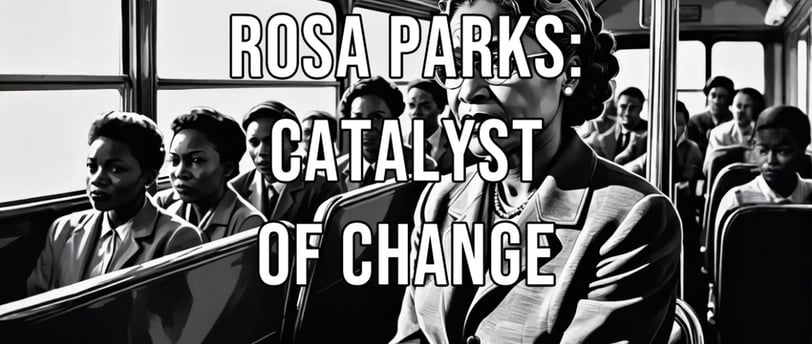Beyond the Bus: Parks' Legacy of Activism
Discover how the courageous acts of a single woman sparked a movement that changed the course of history. We take you beyond the headlines of Rosa Parks' famous bus protest to reveal the complexities of her life and early experiences that shaped her steadfast fight for justice. From her roots in a family with deep connections to the legacy of slavery in Tuskegee, Alabama, to her formative education at the Montgomery Industrial School for Girls, Rosa's journey was one of relentless determination. Through her partnership with Raymond Parks and her strategic involvement with the NAACP, we explore how her activism was meticulously crafted, culminating in that pivotal moment on December 1, 1955. Her time at the Highlander Folk School was not just a footnote but a cornerstone in her commitment to nonviolent resistance.
Footprints In The Dark
10/15/20243 min read


In this captivating podcast episode, we delve into the profound legacy of Rosa Parks, going beyond the well-known bus incident to explore the rich tapestry of her life and activism. Often simplified into a single act of defiance, Rosa Parks' story is far more complex and deeply rooted in her experiences growing up in the segregated South. Born in 1913 in Tuskegee, Alabama, to parents with direct ties to the legacy of slavery, Parks was shaped by a world of stark racial inequality. Her upbringing in a family that instilled a strong sense of self-worth laid the foundation for her lifelong commitment to justice.
Parks' journey toward activism was not a solitary path but a collaborative effort alongside her husband, Raymond Parks, a fellow activist and member of the NAACP. Together, they navigated the treacherous waters of racial discrimination, documenting injustices and organizing voter registration drives at a time when such actions could have dire consequences. This partnership was a testament to the power of collective action, a recurring theme throughout her life. Her education at the Montgomery Industrial School for Girls, an institution dedicated to empowering young black women, further fueled her determination to fight for equality.
A pivotal moment in Parks' activism was her time at the Highlander Folk School, a training ground for civil rights leaders where she learned the principles of nonviolent resistance. This education in peaceful protest strategies became instrumental in her approach to activism, culminating in the historic act of refusing to give up her bus seat on December 1, 1955. This deliberate act of defiance was not born of physical exhaustion but rather a profound weariness of giving in to systemic oppression. It was a catalyst for the Montgomery Bus Boycott, a powerful demonstration of unity and resilience that lasted 381 days and galvanized the Civil Rights Movement.
The impact of Parks' actions extended far beyond Montgomery, inspiring a new wave of civil rights activism across the nation. Her story is a reminder of the importance of recognizing the unsung heroes who fight for justice without the spotlight. These individuals, like Parks, embody the spirit of courage and commitment necessary to drive social change. The episode also challenges listeners to reflect on their potential roles in shaping a more equitable world, echoing Margaret Mead's assertion that committed citizens can indeed change the world.
Rosa Parks' legacy is not confined to her pivotal moment on the bus. Even after facing personal and professional hardships, she continued her activism in Detroit, addressing issues like housing discrimination and economic justice. Her dedication to empowering future generations is evident in the Rosa and Raymond Parks Institute for Self-Development, which provides young people with opportunities for growth and social education. Parks' life is a testament to the interconnectedness of justice, as she addressed multiple issues with unwavering determination.
The episode also highlights the broader impact of Parks' activism, including the emergence of Martin Luther King Jr. as a prominent leader in the Civil Rights Movement. His message of nonviolence and ability to mobilize communities was instrumental in furthering the cause that Parks had championed. The success of the Montgomery Bus Boycott was a significant victory, yet it came at a personal cost for Parks, who faced job loss and threats to her safety. Despite these challenges, she remained steadfast in her pursuit of justice, leaving a lasting legacy that continues to inspire.
As we reflect on Parks' extraordinary life, we are reminded that the fight for social justice is ongoing. Systemic racism and discrimination persist in various forms, challenging us to continue the work she began. This episode calls on listeners to consider their acts of courage and how they can contribute to the fight for a fairer world. Rosa Parks' legacy is a powerful reminder of the impact one person can have when driven by a deep sense of justice and commitment to change.
